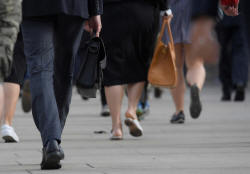|
Britain considers tough
curbs on EU migration
 Send a link to a friend
Send a link to a friend
 [September 06, 2017]
By Elizabeth Piper and William James [September 06, 2017]
By Elizabeth Piper and William James
LONDON (Reuters) - Britain is considering
measures to restrict immigration for all but the highest-skilled EU
workers, a leaked government document said, plans some companies called
alarming and an opposition lawmaker described as "plainly cruel".
Large flows of migrants from the European Union were one of the reasons
some Britons said they voted to leave the bloc in a referendum last
year, with one of the Brexit campaign's main slogans saying Britain
should "take back control".
But companies, especially those in the catering, social care and retail
industries which depend on the steady stream of workers from abroad, say
they fear a restrictive immigration policy after Britain leaves the EU
will leave them unable to hire the staff they need.
In the document, leaked to the Guardian newspaper and marked 'draft -
official sensitive', the interior ministry said Britain was changing its
focus to make sure, where possible, British companies take on British
workers rather than migrants.

"Put plainly, this means that, to be considered valuable to the country
as a whole, immigration should benefit not just the migrants themselves
but also make existing residents better off," the document said.
A government spokesman said the government did not comment on leaked
draft documents. "We will be setting out our initial proposals for a new
immigration system which takes back control of the UK's borders later in
the Autumn," he said.
The government has also said it would listen to the results of a
year-long study it commissioned in July from the Migration Advisory
Committee to look at the impact of migration and how best to control it
after Brexit.
PLATFORM FOR DISCUSSION
Some of the measures are in keeping with earlier statements from
interior minister Amber Rudd, who has said that Britain would have to
work out a balance between the numbers needed by companies and a level
which does not put pressure on public services, such as hospitals and
schools.
That message was reinforced by Defence Secretary Michael Fallon on
Wednesday, when he said the government would pursue a balanced
immigration policy.
The document described the proposals as "a platform for discussion" and
the Guardian said it had not been agreed with Prime Minister Theresa
May's top team of ministers, who are divided as the best way to control
immigration.

[to top of second column] |

Workers cross London Bridge during the morning rush hour in London,
August 16, 2017. REUTERS/Toby Melville

It proposes that while highly-skilled workers could get a work permit lasting
three to five years, lower skilled workers may only be allowed to work in
Britain for two years to limit the number "of EU citizens able to come to the
UK".
The changes would be introduced over time, and the government could place tough
new restrictions on EU citizens' rights to bring in family members, it said.
The proposed measures stung some employers, with Ian Wright, director general of
the Food and Drink Federation, saying that if they reflect the government's
thinking it shows "a deep lack of understanding of the vital contribution that
EU migrant workers make - at all skill levels - across the food chains".
"Food and drink manufacturing, Britain's largest manufacturing sector, will be
alarmed by the proposals," he said in a statement.
Caroline Lucas, co-leader of the Green Party, criticized the plan as not "just
economically illiterate, it's plainly cruel too", while London Mayor Sadiq Khan
said it was "a blueprint on how to strangle our economy".
But for Brexit supporters, it was "a great step in the right direction for the
UK to take back control of its borders".
"The government is right to prioritize highly skilled and skilled migration,"
said Steven Woolfe, a former member of the anti-EU UK Independence Party and a
lawmaker in the European Parliament."Brexit Britain should continue to attract
the brightest and best, whilst establishing strict control of unskilled labor."

May, who as Britain's interior minister was in control of immigration for six
years before becoming prime minister, has said that free movement of labor would
have to end when Britain leaves the European Union and has long aimed to bring
down immigration to the tens of thousands.
Data in August showed net migration to Britain fell to its lowest level in three
years in the 12 months to the end of March, with more than half the drop caused
by EU citizens leaving and fewer arriving since the Brexit vote.
But, at 246,000, the figure is far higher than the what May describes as "a
sustainable level of migration".
(additional reporting by Kylie MacLellan; Editing by Toby Chopra)
[© 2017 Thomson Reuters. All rights
reserved.] Copyright 2017 Reuters. All rights reserved. This material may not be published,
broadcast, rewritten or redistributed. |